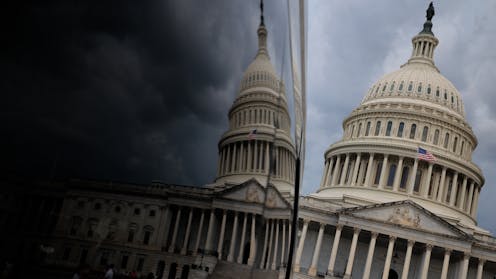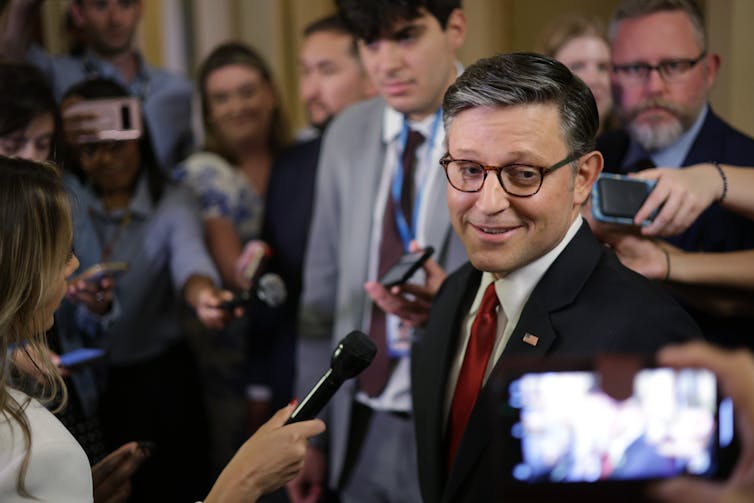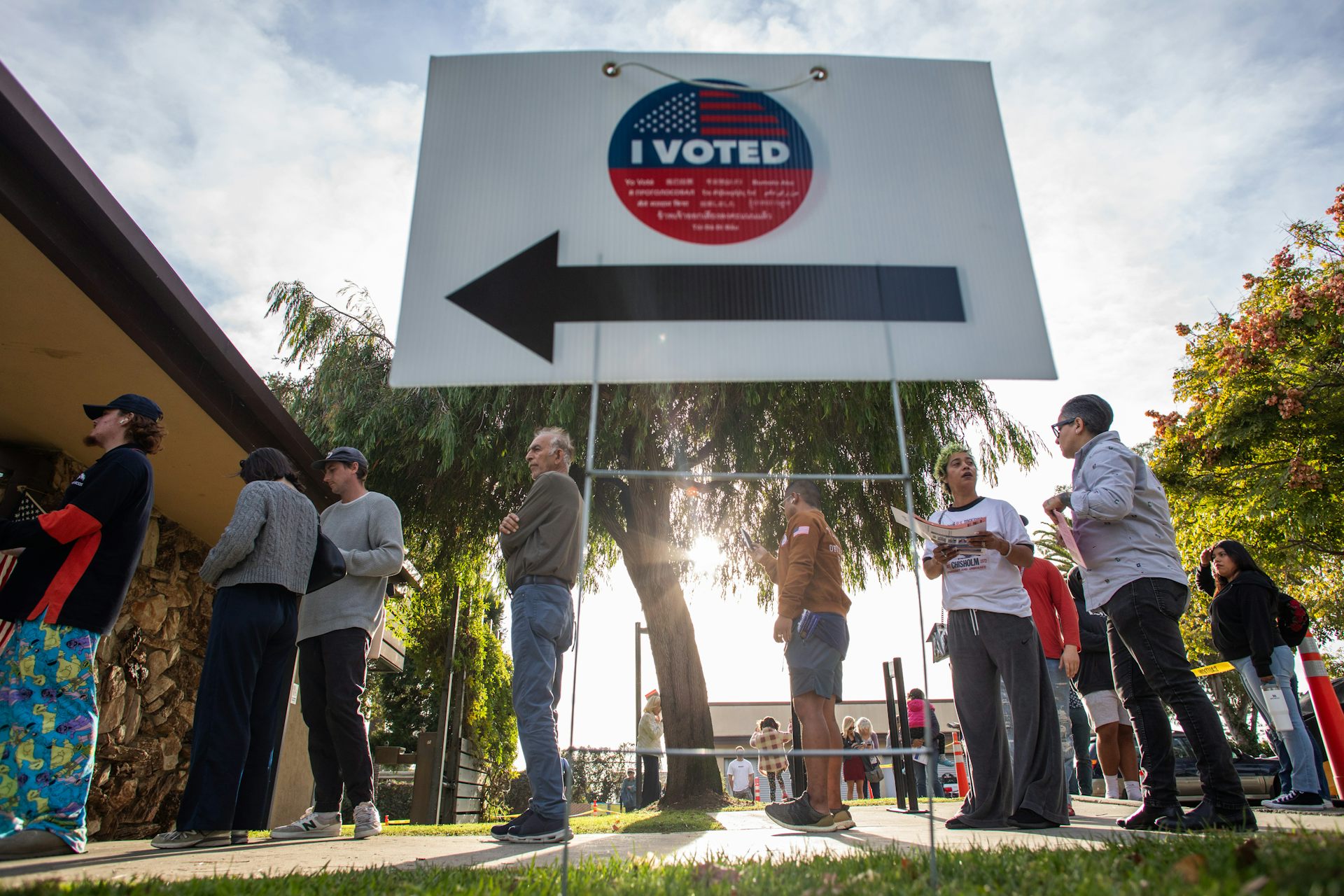One ‘big, beautiful’ reason why Republicans in Congress just can’t quit Donald Trump
Lawmakers who are aligned politically with the president are increasingly voting in line with the chief executive. Doing otherwise could cost them on Election Day.

As the U.S. House of Representatives voted to approve President Donald Trump’s sweeping domestic tax and spending package, many critics are wondering how the president retained the loyalty of so many congressional Republicans, with so few defections.
Just three Republican senators – the maximum allowed for the One Big Beautiful Bill Act to still pass – voted against the Senate version of the bill on July 1, 2025. In the House, only two Republicans voted against the bill, which passed the chamber on July 3.
Among other things, the bill will slash taxes by about US$4.5 trillion over a decade and exempt people’s tips and overtime pay from federal income taxes.
But the bill has been widely panned, including by some Republicans.
Democrats have uniformly opposed it, in part thanks to the bill’s sweeping cuts to Medicaid and Affordable Care Act marketplace funding. This could lead to an estimated 12 million more people without insurance by 2034.
The legislation is also likely to add between $3 trilion and $5 trillion to the national debt by 2034, according to the Congressional Budget Office.
The power of the presidency
Trump is not the first president to bend Congress to his will to get legislation approved.
Presidential supremacy over the legislative process has been on the rise for decades. But contrary to popular belief, lawmakers are not always simply voting based on blind partisanship.
Increasingly, politicians in the same political party as a president are voting in line with the president because their political futures are as tied up with the president’s reputation as they have ever been.
Even when national polling indicates a policy is unpopular – as is the case with Trump’s budget reconciliation bill, which an estimated 55% of American voters said in June they oppose, according to Quinnipiac University polling – lawmakers in the president’s party have serious motivation to follow the president’s lead.
Or else they risk losing reelection.

Lawmakers increasingly partisan on presidential policy
Over the past 50 years, lawmakers in the president’s party have increasingly supported the president’s position on legislation that passes Congress. Opposition lawmakers, meanwhile, are increasingly united against the president’s position.
In 1970, for example, when Republican President Richard Nixon was in the White House, Republicans in Congress voted along with his positions 72% of the time. But the Democratic majority in Congress voted with him nearly as much, at 60% of the time, particularly on Nixon’s more progressive environmental agenda.
These patterns are unheard of in the modern Congress. In 2022, for example – a year of significant legislative achievement for the Biden administration – the Democratic majority in Congress voted the same way as the Democratic president 99% of the time. Republicans, meanwhile, voted with Biden just 19% of the time.
Elections can tell us why
Over the past half-century, the two major parties have changed dramatically, both in the absolutist nature of their beliefs and in relation to one another.
Both parties used to be more mixed in their ideological outlooks, for example, with conservative Democrats and liberal Republicans playing key roles in policymaking. This made it easier to form cross-party coalitions, either with or against the president.
A few decades ago, Democrats and Republicans were also less geographically polarized from each other. Democrats were regularly elected to congressional seats in the South, for example, even if those districts supported Republican presidents such as Nixon or Ronald Reagan.
Much of this has changed in recent decades.
Congress members are not just ideologically at odds with colleagues in the other party – they are more similar than ever to other members within their party.
Districts supporting the two parties are also increasingly geographically distant from each other, often along an urban-rural divide.
And presidents in particular have become polarizing partisan figures on the national stage.
These changes have ushered in a larger phenomenon called political nationalization, in which local political considerations, issues and candidate qualifications have taken a back seat to national politics.
Ticket splitting
From the 1960s through most of the 1980s, between one-quarter and one-half of all congressional districts routinely split tickets – meaning they sent a politician of one party to Congress while supporting a different party for president.
These are the same few districts in Nebraska and New York, for example, that supported former Vice President Kamala Harris for president in 2024 but which also elected a Republican candidate to the House that same year.
Since the Reagan years, however, these types of districts that could simultaneously support a Democratic presidential nominee and Republicans for Congress have gone nearly extinct. Today, only a handful of districts split their tickets, and all other districts select the same party for both offices.
The past two presidential elections, in 2020 and 2024, set the same record low for ticket splitting. Just 16 out of 435 House districts voted for different parties for the House of Representatives and president.
Members of Congress follow their voters
The political success of members of Congress has become increasingly tied up with the success or failure of the president. Because nearly all Republicans hail from districts and states that are very supportive of Trump and his agenda, following the will of their voters increasingly means being supportive of the president’s agenda.
Not doing so risks blowback from their Trump-supporting constituents. A June 2025 Quinnipiac University poll found that 67% of Republicans support the bill, while 87% of Democrats oppose it.
These electoral considerations also help explain the unanimous opposition to Trump’s legislation by the Democrats, nearly all of whom represent districts and states that did not support Trump in 2024.
Thanks to party polarization in ideologies, geography and in the electorate, few Democrats could survive politically while strongly supporting Trump. And few Republicans could do so while opposing him.
But as the importance to voters of mere presidential support increases, the importance of members’ skill in fighting for issues unique to their districts has decreased. This can leave important local concerns about, for example, unique local environmental issues or declining economic sectors unspoken for. At the very least, members have less incentive to speak for them.
Charlie Hunt does not work for, consult, own shares in or receive funding from any company or organization that would benefit from this article, and has disclosed no relevant affiliations beyond their academic appointment.
Read These Next
Trump says climate change doesn’t endanger public health – evidence shows it does, from extreme heat
Climate change is making people sicker and more vulnerable to disease. Erasing the federal endangerment…
FDA rejects Moderna’s mRNA flu vaccine application - for reasons with no basis in the law
The move signals an escalation in the agency’s efforts to interfere with established procedures for…
Citizenship voting requirement in SAVE America Act has no basis in the Constitution – and ignores pr
The House has passed a bill to require proof of citizenship for voting. Although it likely won’t become…





